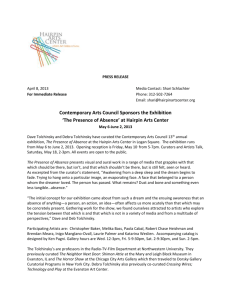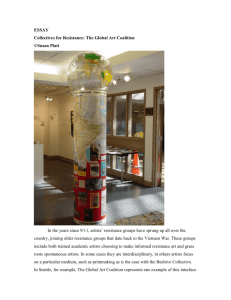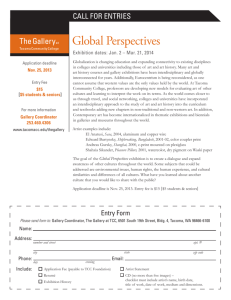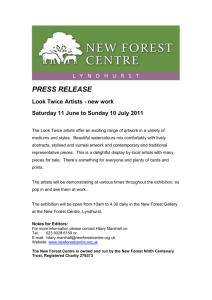Wynn Newhouse Awards Exhibition
advertisement
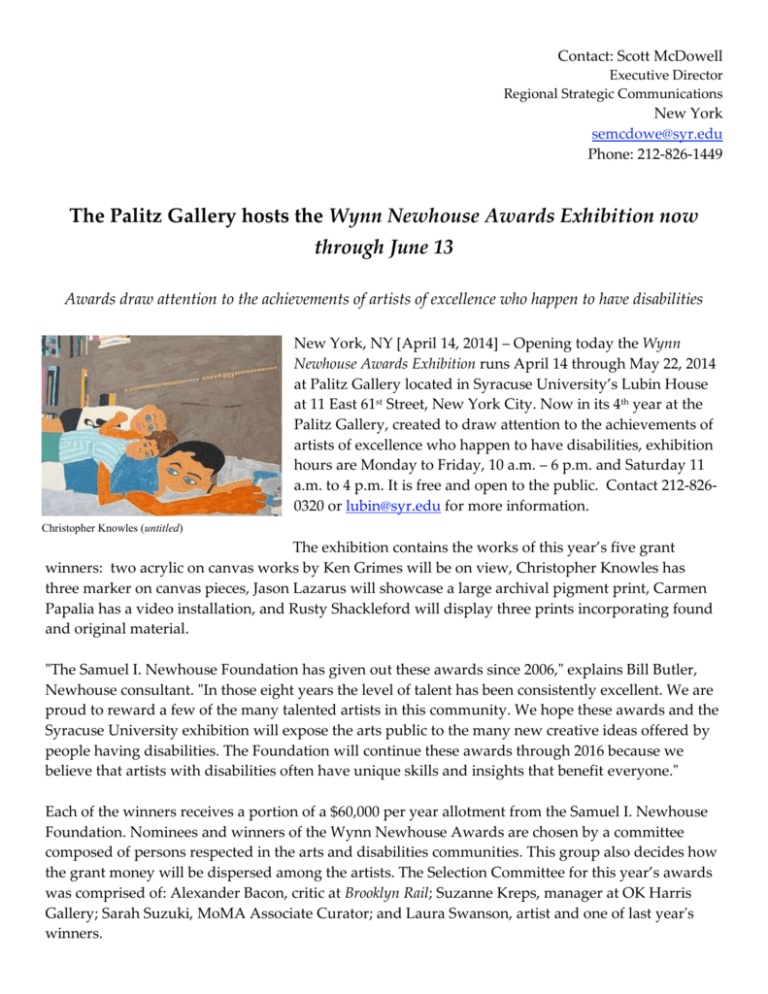
Contact: Scott McDowell Executive Director Regional Strategic Communications New York semcdowe@syr.edu Phone: 212-826-1449 The Palitz Gallery hosts the Wynn Newhouse Awards Exhibition now through June 13 Awards draw attention to the achievements of artists of excellence who happen to have disabilities New York, NY [April 14, 2014] – Opening today the Wynn Newhouse Awards Exhibition runs April 14 through May 22, 2014 at Palitz Gallery located in Syracuse University’s Lubin House at 11 East 61st Street, New York City. Now in its 4th year at the Palitz Gallery, created to draw attention to the achievements of artists of excellence who happen to have disabilities, exhibition hours are Monday to Friday, 10 a.m. – 6 p.m. and Saturday 11 a.m. to 4 p.m. It is free and open to the public. Contact 212-8260320 or lubin@syr.edu for more information. Christopher Knowles (untitled) The exhibition contains the works of this year’s five grant winners: two acrylic on canvas works by Ken Grimes will be on view, Christopher Knowles has three marker on canvas pieces, Jason Lazarus will showcase a large archival pigment print, Carmen Papalia has a video installation, and Rusty Shackleford will display three prints incorporating found and original material. "The Samuel I. Newhouse Foundation has given out these awards since 2006," explains Bill Butler, Newhouse consultant. "In those eight years the level of talent has been consistently excellent. We are proud to reward a few of the many talented artists in this community. We hope these awards and the Syracuse University exhibition will expose the arts public to the many new creative ideas offered by people having disabilities. The Foundation will continue these awards through 2016 because we believe that artists with disabilities often have unique skills and insights that benefit everyone." Each of the winners receives a portion of a $60,000 per year allotment from the Samuel I. Newhouse Foundation. Nominees and winners of the Wynn Newhouse Awards are chosen by a committee composed of persons respected in the arts and disabilities communities. This group also decides how the grant money will be dispersed among the artists. The Selection Committee for this year’s awards was comprised of: Alexander Bacon, critic at Brooklyn Rail; Suzanne Kreps, manager at OK Harris Gallery; Sarah Suzuki, MoMA Associate Curator; and Laura Swanson, artist and one of last year's winners. About the Artists Ken Grimes Grimes grew up as an only child without much of an extended family. He described his youth as a period of "cosmic loneliness", always longing for companionship. "When I discovered shows such as Star Trek, I started to think about the idea of life outside of earth," explains Grimes. His paintings have gone through a number of media and styles, but he has diligently maintained themes of alien intervention, space signals, synchronicities and government cover-ups; using his artwork to document his findings and speculations. He paints only in black and white, which he maintains is the most direct way of showing the contrast between truth and deception. These bold graphics, created with black paint on white canvas and Masonite, have become more iconographs than pictures. Grimes has battled psychological issues. He also has impaired vision. Christopher Knowles Knowles has shown a diverse practice over the years, utilizing writing, painting, sculpture, and performance, while exhibiting a fascination with the aural and visual elements of language. His poetry was part of the libretto of the Phillip Glass Opera “Einstein on the Beach” .He designed operatic sets for a performance at the Louvre. Most recently in 2013, Knowles has given solo presentations of his paintings as well as a new performance. In January 2013, Knowles’ painting exhibition at Gavin Brown’s enterprise, featured an evening of live-reading of and audio-listening to his poems. The exhibition was met with critical acclaim in The New Yorker, and Time Out New York, among other publications. Jason Lazarus Lazarus is engaged in researching and imaging private, marginalized, and nascent public histories in order to recast their relationship to the public through discourse, display, and exchange. Employing authored and found images, site-specific installations, and curating publicly-sourced stable and live archives, his practice embraces the interplay of artist and public as author, private and public image sourcing and solicitation, and the pathos of both the mundane and the marked event. More recently his practice has focused on image installations and sculptural projects that take cues from this methodology, but look to public participants to share in shouldering the burden of witnessing and authoring their experience. Born with Arthrogryposis Multiplex Congenita, a congenital birth defect, Lazarus has undergone numerous surgeries to repair problems in the wrist, ankle, knee and hip areas. Carmen Papalia Papalia designs experiences that invite participants to expand their perceptual mobility and claim access to public and institutional spaces. Often requiring trust and closeness, these engagements disorient the participant while introducing new modes of orientation that allow for perceptual and sensorial discovery. "It is a chance to unlearn looking," says Papalia "and to take ones first few steps into a non-visual world." Each walking tour, collaborative performance, public intervention, museum project and art object produced is a temporary system of access to a new environment. "My work makes visible the opportunities for learning and knowing that become available through the nonvisual senses." Papalia has vision issues. He lives with a medical condition known as Retinitis Pigmentosa (which can lead to blindness) as well as Sickle Cell Anemia. Rusty Shackleford Shackleford finds inspiration for his work by things he sees like bits of brightly colored trash or thrown out books filled with the faded grains of yesterday’s image. Books such as these, along with other detritus, are potential materials that serve as inspiration and raw data for new work. "Found images act as conceptual substrates for my paintings," says Shackleford. "Ultimately, I am not interested in creating beautiful paintings or perfect prints, rather I am interested in crystalizing a frenetic gesture and capturing the quickness of happenstance." Shackleford often pours or drips colors directly from the tube and then mixed together from the pressure of the scanner lid or from the actions of his hand sliding the image around as it is being scanned. His process employs an element of chance - never knowing what he will get when the scan is made. About the Awards Wynn Newhouse was a prominent and avid art collector who lost functional use of one hand in an industrial accident as a young man. By midlife he was diagnosed with Multiple Sclerosis. Wynn envisioned The Wynn Newhouse Awards in 2005. The program provides grants to talented fine artists with disabilities as defined by the Americans with Disabilities Act. Wynn was joined by top artists, curators and critics who shared his belief that many disabled people have unique insights and skills that can enhance their ability to create exciting art. He hoped that these exhibitions would enable the arts public to see the many creative ideas contained in their works. Wynn passed away in 2010. Palitz Gallery, located in Syracuse University's Lubin House, is the Syracuse University Art Galleries' visual arts venue in midtown Manhattan. Opened in 2003, the gallery is made possible through the support of SU alumna Louise Palitz and her husband Bernard. Throughout the year, the gallery presents a variety of notable exhibitions from the University’s collection and private and museum collections.


